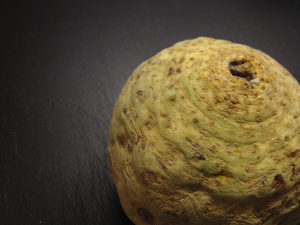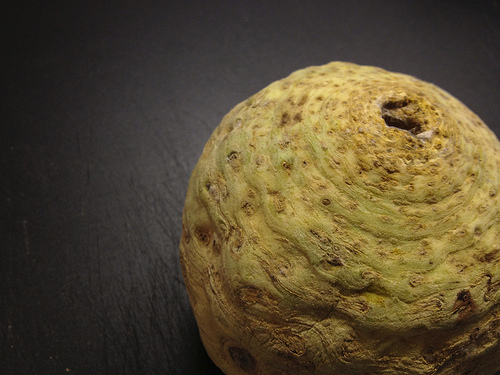Short Answer:
Yes, Celeriac is Paleo!
Are Celery and Celeriac the Same?
Also known as celery root, celeriac is an edible root vegetable closely related to celery. Though both belong to the same family, Apiaciae (carrot family), celery and celeriac are two different things. Celery is a green-stemmed cluster that ranges in color from green to white. Celeriac on the other hand is whitish brown in color and has a similar taste with that of celery and parsley. Celeriac has a coarse, knobby root with celery-like leaves.
Celeriac was originally grown in Northern Europe and Mediterranean and is abundant during the winter season. Its root is the only part that is used for cooking. Celeriac can be mashed and used in main dishes, soups and stews.
Nutritional Profile of Celeriac
Celery root unlike most tubers is very low in carbohydrates but very nutrient-dense. It contains high levels of vitamin B, C and K, calcium, iron, phosphorus, potassium, magnesium, manganese, sodium and zinc. Celeriac is also an excellent source of dietary fiber and protein.
Health Benefits of Celeriac
Diets with fruits and vegetables are proven to be beneficial for the body. Consumption of root vegetable celeriac has a wide array of benefits.
Heart Health
The vitamin K found in celeriac provides 34% of the daily recommended allowance. Vitamin K helps in maintaining blood pressure levels. Celeriac is low in cholesterol and saturated fats and incorporating it in your diet may reduce the risk of heart-related diseases like heart attack, and cholesterol build-up in the arteries resulting in stroke.
Bone Health
Another benefit of vitamin K is that it helps increase bone mass by promoting osteotrophic activity in the bones. The copper and phosphorus in celeriac can help in teeth and bone formation too.
Anti Cancer Properties
The high amounts of antioxidants in celeriac can help prevent cell oxidation. It’s anti-cancer properties that may help fight colon cancer.
Digestive Support
Celeriac is an excellent source of dietary fiber, which is important for digestive health and metabolism. The slight bitterness of celeriac comes from compounds that aid in bile production which promotes good digestion.
Immune System Health
Celeriac has anti-microbial properties that make it effective in boosting immune system health, preventing diseases. The vitamin C in celeriac has antioxidant functions that can prevent colds and flu.
Blood Health
Iron is also abundant in celeriac which can help balance the blood levels in the body especially for people suffering from anemia. Iron can help restore blood levels in the body to prevent illnesses and bleeding.
Other Names for Celeriac
Celery root, knob celery
What Experts Say About Celeriac
In addition to these nutrients, celeriac is an excellent source of dietary fiber, which is important for digestive health and can help you feel satiated for longer. – Mark Sisson
All you ever wanted to know about Celeriac and Paleo
Mark’s Daily Apple. Top 10 Spring Vegtables.
http://www.marksdailyapple.com/spring-vegetables/#axzz3O46UEkGS
Is Celeriac Paleo?
http://paleoporn.net/q/is-celeriac-paleo/
Paleo Leap. Celeriac Mash
http://paleoleap.com/celeriac-mash/
Nutrition and You. Celeriac Nutrition Facts
http://www.nutrition-and-you.com/celeriac.html
Juicing for Health. Health Benefits of Celeriac
http://juicing-for-health.com/health-benefits-of-celeriac.html
Did we miss anything?
Comment below and let us know what you think. Do you agree with our conclusion?
photo credit: Celeriac (110/365)

